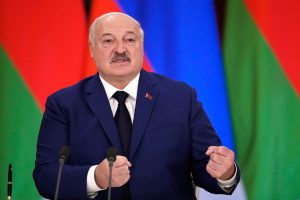TALLINN, Estonia (AP) — Activists have raised concerns about the health of a Belarusian journalist sentenced to 3 1/2 years in prison in the latest closed-door trial targeting the country’s media.
Aleh Suprunyuk, 58, was sentenced on Aug. 8 after being found guilty of participating in an extremist group for articles he wrote for the Belarusian Association of Journalists, or BAJ. Belarus’ government labeled the organization as “extremist” — a common label used by officials to crack down on dissidents — in March 2023. Details of his trial only became public knowledge on Monday.
The journalist’s conviction is part of an ongoing crackdown on government critics following unprecedented mass protests following Belarusian President Alexander Lukashenko ‘s disputed election on Aug. 9, 2020. Human rights groups say authorities have arrested more than 65,000 people and hundreds of thousands have fled the country for fear of persecution.
Suprunyuk, a prominent editor for the First Region news website and a former chairman of the Brest branch of the BAJ, monitored the persecution of the country’s media workers.
His sentencing follows a similar closed trial against Belarusian journalist Daniil Palianski, who was sentenced on July 25 to 10 years in prison for “high treason.”
Independent journalist Pavel Dabravolski has also been detained in a pretrial detention center in Minsk, according to Belarus’ Viasna Human Rights Center.
The health of Suprunyuk, who is disabled, has sharply deteriorated since his arrest in January, BAJ leader Andrei Bastunets said in a statement Monday. The group says that 38 Belarusian journalists are currently behind bars.
“The situation is only getting worse and there are serious concerns about Suprunyuk’s health,” Bastunets said. “We have had no contact with him for six months, which shows the authorities’ attitude toward journalists.”
He also said that repression in Belarus showed no signs of stopping, despite a phone call between Lukashenko and U.S. President Donald Trump on Aug. 15.
“We see that the U.S. president’s calls to release Belarusian political prisoners and Trump’s phone calls with Lukashenko are leading to opposite results — political repressions are not stopping.”
Writing on social media, Trump said he “had a wonderful talk with the highly respected President of Belarus.”
“The purpose of the call was to thank him for the release of 16 prisoners. We are also discussing the release of 1,300 additional prisoners,” Trump said.
There are 1,196 political prisoners in Belarus, including Nobel Peace Prize laureate and peace activist Ales Bialiatski, according to the human rights group Viasna.

